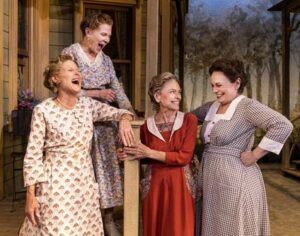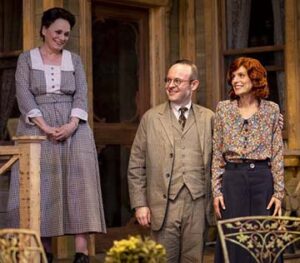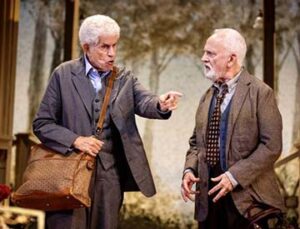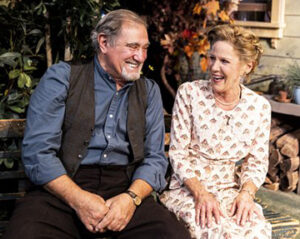By Lucy Komisar
“Morning’s at Seven” written in 1939 by Paul Osborn, starts out as a small town family story of the innocent 1920s. It’s often comic, but it’s also a serious look at the difficulties and hidden sorrows that afflict people who seem quite comfortable, discontents that begin to dominate as they get older.
This is a fine production, well-acted by an accomplished Broadway-credits cast and smoothly directed by Dan Wackerman.

The four Gibbs sisters live in two grey clapboard two-story houses next door to each other or up the road. Three have husbands, and all are just short of or past 70. It’s the midwest, but could be anywhere.
Cora (a distraught Lindsay Crouse) has a gnawing unhappiness, because her sister Arry (Alley Mills) appears to have an unspoken connection to Cora’s husband Thor (the placid Dan Lauria) and has lived with them for 45 years. Thor seems unaware or uncaring about the non-sexual ménage à trois that is eating at his wife.
Airy is the “spinster,” as they were called in those days. Not that she was an adventurous, creative women who wanted independence; she just never found a guy. She is also a busy body. Mills does a comic turn in her skin.

Ida (a seemingly solid Alma Cuervo) has a husband Carl (a flakey John Rubinstein), who at 68 feels a failure and is consumed by never having taken the right “fork in the road” to became a dentist.
Their son Homer (Jonathan Spivey, even more flakey) is 40 and has been engaged for 12 years but spends every night at home. He likes living at home, he says: “I’ve got all my things here.” Carl has built a house for him and his bride (if he marries her), but it’s stayed empty for years.
On this day, Homer has brought his betrothed Myrtle (Keri Safran) home to meet his parents for the first time. She is 39, a charmer, and we wonder what she sees in her beau.
Homer tells mother, “She asked what size underwear I wear.” Ida cries, “I never thought she’d buy your underwear.”

Esther, called Esty (a very good Patty McCormack), the most together and appealing of the sisters, has a husband David (equally good Tony Roberts), a former professor who still wears a vest and bowtie and is pretentious and even obnoxious. He tries to use Carl to get back at his wife.
Homer says, “Uncle David is highly educated, he doesn’t like us. He thinks we’re moronic. But David admits that in the eyes of the world he is a failure. We never learn why. McCormack plays Esty as a lot smarter than David. If the play were taking place in feminist times, they’d be long divorced.
This family suffers not just from disappointment, but from arrested development often displayed in family jealousies, rivalries and betrayals.

Desperately, several of them try to figure out how to to fix their lives, and they come up with a musical chairs of living arrangements. The deus ex machina turns out to be the revelation of a secret about what happen between Arry and Thor when she was 17.
This is an often comic soap opera, but also serious drama. These late-in-life crises are real. Maybe the way it speaks to audiences is why the play has gotten several productions on Broadway, where it has won awards, and been staged in theaters around the country. Written more than 80 years ago, it’s a worthy part of the canon.
“Morning’s at Seven.” Written by Paul Osborn, directed by Dan Wackerman. Theater at St. Clement’s, 423 W. 46th St. NYC. 866-811-4111. Runtime 2:10. Opened Nov. 15, 2021, closes Dec 5, 2021. Review on NY Theatre-Wire.

